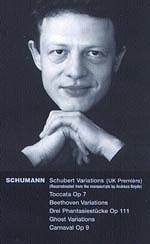This was a notable London debut by a German born pianist who studied in Dresden and the Guildhall School of Music & Drama in London. He has a number of CDs to his credit, some of them recorded at live concerts in Germany. Andreas Boyde is a fresh faced young man with an ever-ready smile and a good platform manner, there to enjoy himself and hoping we will too.Schumann programmes are uncommon and unlikely to be well attended; communication via the 'grape-vine' achieved a nearly-full Wigmore Hall for a programme of mostly unfamiliar items - few of us will have known them all. The well researched programme notes were prepared by the pianist, who began with his own completion of a fragmentary set of variations on a Schubert waltz, its Maestoso introduction familiar from Carnaval. There are five variations and Boyde rounds off his reconstruction with Schubert's original waltz of longing. After this low-key introduction, Andreas Boyde gave a perceptive performance of Schumann's notoriously challenging Toccata, which can often sound an arid clattering of finger-twisters. But although began as a technical exercise for his own recital work, Schumann (as did Chopin) went far beyond a piano study and Boyde followed Clara Wieck, who was recorded as giving it too "poetic meaning - - inbued with delicate and deeply felt colours". He was fully relaxed and in command, attentive to inner voices in the texture, responding to the Wigmore Hall acoustic and never displaying brilliance just for the sake of it, auguring well for what was to come.
Before the interval three more Schumann rarities. The Beethoven variations of 1833, based on the second movement of Beethoven's 7th Symphony, may express his sombre premonitions of later mental illness, and make fleeting references to other passages in the symphonies. Two works from Schumann's late period followed, three Phantasiestucke Op 111 and the Ghost Variations, his last composition, completed whilst he was already suffering from frank mental illness, only a few days before he entered an asylum, to he die there two years later. Those three sets of variations are included in Andreas Boyde's latest CD, a Schumann/Brahms recital [Athene-minerva CD23]
After the interval Andreas Boyde returned to give Carnaval, written by the 23 yr. Old composer in 'compositional fever' Schumann himself had doubts whether an audience could follow its quick changes of mood, and some interpreters try to smooth the contrasts in the spirit of the mature Schumann. Boyde, who had previously considered Carnaval carefully and recorded it live [Athene-Minerva ATHCD8], takes it all fast (with some of Schumann's surprising tempo indications) and allows the moods to take over from each other precipitously. He was in fine form and brought the recital to a memorable close (better than the CD version) resisting afterwards the greedy demands for encores until finally succumbing by pointedly playing a 20-second fragment.
For a dedicated pianist, there is still much Schumann to bring to light and reconsideration. Maybe for a start one of my favourites, the Allegro Op 8, next after the Toccata Op 7?
A full selection of Athene Minerva reviews may be seen here
Peter Grahame Woolf

 Return to:
Return to: